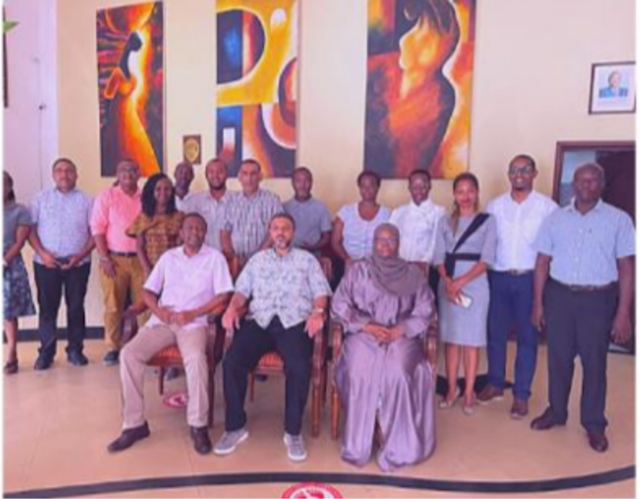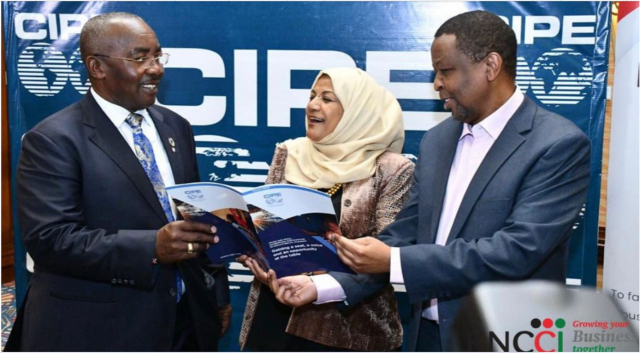Policy and Program Learning’s (PPL) Applied Research Unit works with CIPE’s leadership to identify knowledge gaps in CIPE’s programmatic priorities, creating a learning agenda through PPL’s expanding network of international scholars and in-house research. The Policy Solutions series synthesizes recent research findings that intersect with core CIPE areas of practice.
Policy Solutions: Pathways to Policy Influence – How Kenyan Business Membership Organizations Influence Policy to Improve the Business Ecosystem
Business Membership Organization (BMO) development is a core practice area for CIPE, and BMOs make up a significant portion of our partner network. BMOs are a conduit of representation between the business community and the public sector, and channel their members’ preferences to influence policy through advocacy. Though successful BMOs will always represent and reflect their members’ interests, BMO’s methods and propensity for finding innovative solutions continues to evolve as they face new challenges. To identify recent innovations of BMO policy influence, CIPE’s Policy and Program Learning (PPL) Department commissioned business network experts David Irwin and Mercy Kyande to conduct a study on Interest Group Participation in Government Groups in Kenya – which examines the efficacy of policy advocacy strategies deployed by Kenyan BMOs.
BMOs can influence policy and encourage a healthier business ecosystem in many ways, but a few key examples include by organizing businesses at the grassroots level to build bottom-up support for policy change, publishing white papers for policymakers, and working to build coalitions between like-minded organizations. Though their role in policy influence is important, BMOs often face hurdles when they attempt to influence policy. These challenges often range from a lack of technical or material capacity, the absence of internal member representation, or difficult political or economic contexts. However, through Irwin and Kyande’s research, we identify new pathways to influence policy.
The research suggests that business advocacy in Kenya may be comparatively more robust than in other emerging markets because business organizations enjoy institutional policy support. The country’s constitution enshrines the right to “formal consultation arrangements” between the public and government. In addition, the Kenyan government also delegates regulatory responsibility to several government-appointed bodies — from committees to task forces. While the true autonomy and discretion of these government-appointed bodies varies, as some have more direct government oversight than others, they also provide an avenue for BMOs to have a direct impact on regulatory policy.

The authors demonstrate the rising role of BMOs in Kenyan policy by providing examples of several BMOs that succeeded in influencing policy decisions. The researchers show how the Business Advocacy Fund (BAF) supported 800 BMOs between 2006-2020, resulting in 426 policy reforms. One major reform that came about after a BMO advocacy campaign was the 2015 executive order, “Mwongozo.” Mwongozo established guidelines for state-owned organizations and emphasized the necessary role of interest group representation within their boards.
Using a combination of analysis of survey results and semi-structured interviews, the authors investigate the extent of BMO representation and their degree of policy impact in government committees in Kenya. The findings show how large BMO representation is present on both the boards of government-owned entities (“parastatals”) and government advisory committees. When interest groups embed themselves in these committees and collaborate closely with the government, it results in measured policy impact – especially when the collaboration is of a technical nature.
Survey and Interview Results:
From the survey, we learn that there is a large degree of trust among businesses in these public-private partnerships. For example, over 93% of those surveyed agree that committees have a clear purpose, while 75% agree that committee-produced reports led to policy reform. See the full table below:
| Question | Results |
| Committees have a clear purpose | 93% agree |
| Committees are “transparent, open, and fair” | 80% agree |
| Method of appointment to government committees and parastatal boards | 45% appointed through the constitutional right to representation on a committee
28% appointed by Cabinet Secretary 14% through competitive selection (application) Remainder invited to join |
| Perceived balance between private and public sector representation | 75% of respondents perceived an equitable balance between private and public sector representation |
| Committee produced reports lead to policy reform | 75% of respondents agree
|
| Does committee participation assist your BMO? | 93% of respondents agree it is overall helpful to participate |
| Does interest group participation assist in policy recommendations? | 67% agree that participation is helpful with policy recommendation |
Recommendations for Policy Impact
This research points to how BMOs can use this form of representation to advocate for policy reform. After establishing that effective advocacy may need some institutional support, Irwin and Kyande recommend the following to maximize policy impact:
| Private Sector | Public Sector |
| Conduct systematic stakeholder mapping of public sector boards, task forces, and committees and nominate members with appropriate knowledge and expertise | Apply the principles of Mwongozo to all government boards, task forces, and committees |
| Set realistic goals about the degree and type of policy impact on a committee | Increase transparency and accountability of appointments to boards, task forces, and committees:
|
| Require that representatives prepare descriptive reports for discussion within the BMO (at a board or policy committee level) | Aim for representative membership, including but not limited to:
|
| Share information between BMOs on discussions about future policy and regulatory reform to increase transparency | Create and maintain an online database of all state-owned corporations, task forces, and committees so the public can submit requests, opinions, and policy preferences |
| When multiple BMOs retain interest in the work of a committee, the BMOs should coordinate effective representation strategies between themselves | Maintain a publicly accessible list of all members of boards, task forces, and committees with the disclosure of possible conflict of interest (e.g., nomination by a BMO) |
| Consider establishing an independent body that monitors the work of boards, task forces, and committees, and offers the opportunity to consult and review policy for any member of the committee | Make public all reports and proposals related to the review, creation, or implementation of policy, legislation, and regulation |

The researchers’ recommendations for the private sector suggest an opportunity for collaboration between private sector organizations because policy impact is maximized when diverse private sector stakeholders work together on policy design.
Given CIPE’s experience in this arena, one avenue for associations and other sections of the private sector to work together and inform policy decisions is by developing a National Business Agenda (NBA). An NBA is an important tool for the business community to communicate policy preferences by offering clear and actionable recommendations to improve the business climate. For BMOs to maximize their policy impact, the research tells us that they must have a strong understanding of the technical aspects of the policy they wish to impact, and that they need to provide suggestions, not just requests. Through the NBA process, BMOs put themselves in a position to establish policy priorities that reflect their members’ needs as well as to leverage the collective knowledge and aggregate preferences of their members.
The NBA process is an opportunity to implement many of the authors’ recommendations. In the case of the Association of Nigerian Women Business Network (ANWBN), a coalition of 52 women-led businesses and professional associations, the ANWBN worked with a range of the network’s association leaders to create an advisory committee, establish working groups on specific policy priorities, and conduct research to ensure the effectiveness of policy suggestions. This process ultimately led to the creation of a Women’s National Business Agenda (WNBA). The WNBA’s policy advocacy impacted policy in three ways:
- Public Procurement Act of 2007 – required that governments prioritize locally manufactured products;
- Secured Transactions in Movable Assets Act of 2017 – eased access to finance and credit for micro and small enterprises;
- Gender and Equal Opportunity Bill – reintroduced in 2019, the bill’s language supports equal rights for women in employment, education, and property ownership.
Through the NBA process, associations can implement several of Irwin and Kyande’s recommendations for maximizing policy impact:
- systematic stakeholder and policy priority mapping;
- setting realistic and actionable policy goals;
- preparing descriptive reports for discussion within the stakeholder network;
- sharing information between members of the network for future policy coordination and transparency; and
- policy and stakeholder coordination through effective representation of stakeholders.
Though BMOs can impact policy in many ways, Irwin and Kyande’s observations point to effective and innovative ways to maximize policy impact. The NBA process is a time-tested and effective option for CIPE and our networks of BMOs to collaborate on policy influence, and through this process, implement the recommendations generated through this research.
Published Date: October 23, 2023
